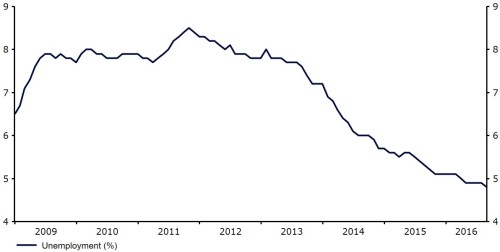The US Dollar surged to the strongest position against its major peers in almost 14 years on Wednesday, while strengthening to a twelve month high against the Euro.
Financial markets are now pricing in a 95% chance that the Fed will raise interest rates when it next meets on 14 December following some hawkish comments from senior Fed policymaker James Bullard yesterday. Bullard explicitly claimed that the Fed will hike interest rates next month barring any major shock, adding to a relatively long list of officials in the US since the election to voice support for a December rate increase.
The common currency has proven particularly vulnerable to Dollar strength. The Euro traded below 1.07 for the first time since the beginning of December 2015.
Meanwhile, Sterling weakened for the fourth straight session against the Dollar on Wednesday, completely ignoring a relatively strong labour report that showed unemployment in the UK fell to its lowest level in 11 years in the three month to October (Figure 1).
Figure 1: UK Unemployment Rate (2009 – 2016)
Today looks set to be another busy day in the currency markets. The ECB will be releasing the minutes of its latest monetary policy meeting this afternoon, while Chair of the Federal Reserve Janet Yellen will be speaking in front of Congress at 15:00 UK time. We expect a relatively hawkish tone, as Yellen continues to prepare the market for higher interest rates in the coming weeks.
Major currencies in detail:
GBP
The Pound fell 0.2% yesterday amid a broadly stronger US Dollar.
Investors overlooked Wednesday’s strong labour report. Unemployment in the UK fell by 37,000 to 1.6 million in the three months to September, unexpectedly taking the jobless rate to 4.8% from 4.9%, its lowest level since September 2005. Earning growth also proved solid, with average weekly earnings growing by 2.3% including bonuses and 2.4% excluding bonuses. This remains well above the level of inflation, meaning that real wage growth is firmly positive.
Despite these strong numbers we still expect the UK labour market to be adversely affected by the Brexit vote and expect to see an increase in unemployment and dampening wage growth developing around the turn of the year.
UK retail sales are forecast to have accelerated last month when announced this morning.
EUR
The Euro sank below 1.07 to the US Dollar yesterday, before paring back most of its losses in afternoon trading to finish just 0.2% lower.
With economic news out of the Euro-area few and far between on Wednesday, the single currency was driven almost entirely by events elsewhere, particularly growing expectations for an interest rate hike by the Fed before the end of the year.
The only particularly noteworthy news yesterday came from the European Commission, which claimed the Eurozone as a whole needs to loosen its fiscal policy stance next year in order to boost the sluggish economic recovery.
The ECB’s meeting accounts at 12:30 UK time will be the main focal point in the Eurozone today. Inflation data this morning is expected to remain unchanged at 0.5%.
USD
The Dollar rose by 0.2% against its major peers yesterday, with the Dollar index rising to its highest position since April 2003.
Economic news out of the US was relatively underwhelming, although did little to materially damage US Dollar strength. Industrial production was flat in the month to October, defying expectations of a modest 0.2% increase. There was also a minor downward revision in the previous month’s number from 0.1% to -0.2%.
Producer prices also surprised to the downside. Prices were unchanged in October, growing by just 0.8% on a year previous compared to the 1.2% consensus.
Inflation in the US is expected to remain mostly unchanged when released at 13:30 today.
Receive these market updates via email
